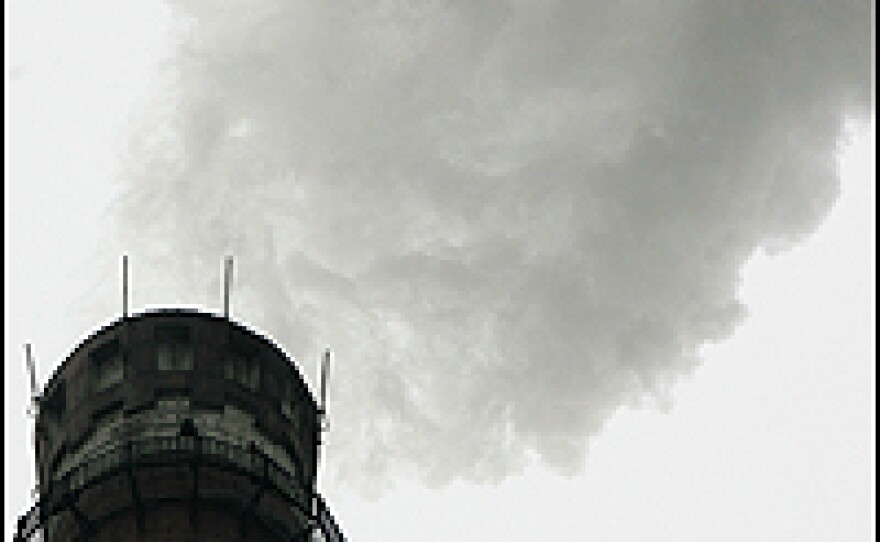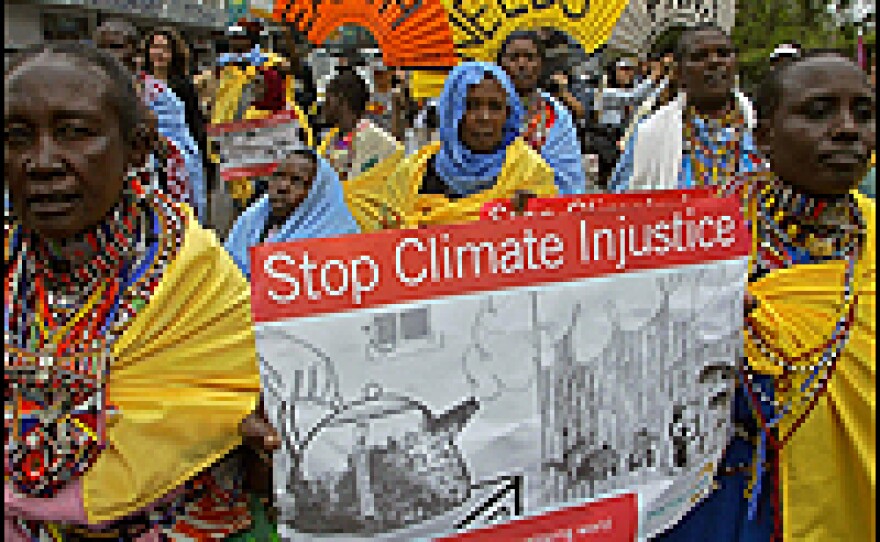

Twelve states and a coalition of environmental groups sued the Bush administration in 2003 for refusing to issue regulations limiting carbon emissions from cars and power plants. On Wednesday, the case reaches the Supreme Court, where justices will hear the arguments on both sides.
Soon after President Bush took office, his EPA administrator, former New Jersey Gov. Christine Todd Whitman, traveled to Europe to meet with the top eight European industrial powers and came to an agreement to cap carbon emissions. But when she returned to the U.S., she says, the president -- under pressure from Republican senators from energy-producing states -- reversed a campaign pledge to cap carbon emissions. Whitman says the decision was driven by political considerations.
The basic question before the court: What are the requirements of the Federal Clean Air Act? The law mandates that the EPA shall regulate any pollutant from motor vehicles or power plants that may reasonably be anticipated to endanger public health or welfare. That includes pollutants that affect weather and climate.
In 1999, a group of environmental scientists pointed to this legal standard when they petitioned the EPA to issue regulations that would confront the issue of global warming. Four years later, a dozen states went to court, claiming they were being harmed by the EPA's refusal to act.
The first question facing the justices is whether carbon dioxide is a pollutant at all. The administration claims it isn't, and is backed by the auto and energy industries in that claim.
"We're talking about carbon dioxide," says former Solicitor General Ted Olson, who is representing the Alliance of Automobile Manufacturers. "It's necessary for life. A pollutant is something that fouls the air, a contaminant. No EPA administrator in history has ever considered carbon dioxide a pollutant."
But Russell Train, who served as EPA administrator in the Nixon and Ford administrations, counters that carbon dioxide is no different than other natural substances in the air that have been deemed pollutants and regulated in the past.
Train, who was the EPA administrator when the Clean Air Act went into effect, overrode objections from industry in order to regulate lead emissions from automobiles in the 1970s. The controversy back then, he says, was very similar to today's. "There was substantial evidence of adverse health effects from these air pollutants," he says, "but it was very hard to show a direct correlation, and industry argued that there were other sources of lead in the atmosphere."
In a friend-of-the-court brief, Train and other past Republican and Democratic EPA administrators note that once the EPA ordered a phase-out of lead additives in gasoline, change resulted: Lead levels in peoples' blood -- and the attendant harms -- dropped precipitously. As a result, Congress amended the Clean Air Act to adopt Train's approach to evaluating pollutants.
In this case, however, the Bush administration contends that the science is not clear on global warming or on the effects of regulating carbon emissions. Olson agrees with that position.
"In this instance, the EPA is saying carbon dioxide is not a pollutant, and even if it was, we don't know enough yet to deal with it," Olson says.
But Train and other environmentalists counter that the science of predicting environmental harm before it's too late is seldom absolute. They say the case for limiting carbon emissions is every bit as strong as it was for lead, or for ozone-depleting chemicals, or other substances that have been regulated by the EPA over the last three decades. David Doniger of the Natural Resources Defense Council says the connection is as strong as the link between smoking and lung cancer.
The government replies that the Clean Air Act requires deference to the EPA administrator's judgment on these matters, and that the current administrator has concluded it would be inadvisable to enact rules and regulations at this time.
"What our opponents are urging here is a practice of 'ready, fire, aim,'" says Olson. "It would be foolhardy to enact a regulation imposing requirements on motor vehicles when it is not clear whether that would sufficiently address the problem. You may do some damage to the economy, you may cause ripple effects in other industries that could conceivably cause a greater increase of emissions of carbon dioxide from other sources. You really need to know what you're doing before you start writing laws."
The NRDC's Doniger is insistent: "The Clean Air Act says put on the pollution controls that are technically feasible and economically achievable, and do that with the lead time the auto industry needs."
Former EPA administrator Russell Train adds that industry needs regulations in place to plan for the next generation of cars and plants. Indeed, some energy companies have sided with environmental groups in this case for precisely that reason. Entergy, one of the nation's largest producers of electric power, says in a legal brief that it needs to plan now to build plants that will deal with an expected doubling in consumer demand for power over the next 50 years. And Entergy says it can't plan to build environmentally sound plants if competitors are free to build cheaper, but more polluting plants.
The Bush administration argues that no national solution will solve the problem of carbon emissions -- that a global agreement must be reached.
But environmentalists counter that the Bush administration has repeatedly walked away from such international agreements, despite the fact that the U.S. is responsible for 25 percent of the world's greenhouse-gas emissions.
At Wednesday's Supreme Court hearing, the Bush administration is expected to focus much of its argument not on the merits of the case, but on the question of whether the courts can examine this issue at all. The administration contends that none of the parties challenging the EPA's inaction on carbon emissions have the right to sue -- not even the 12 states, led by Massachusetts.
The states contend that they are suffering significant damage because of the EPA's failure to act. They claim they are losing shoreline because of melting ice and rising oceans, that floods and storms are more severe, causing greater damage, and that controlling smog is getting more difficult. And the Western states say their snow pack is melting, jeopardizing their water supply.
Olson says that sort of generalized damage is not adequate to make the legal case: "If it does exist, it is damage to humanity in general, not to Massachusetts," he says. "Courts need concrete particularized cases before they can constitutionally render a decision. Otherwise, anybody with a grievance can say 'Gee, the ocean's too high this year. I think we should have a lawsuit against the EPA.'"
Doniger's response: "The administration is very muscular on some issues. They say they're Superman -- they can do anything they want to, regardless of Congress." But on other issues, he notes, the administration takes a different tack: "When it comes to global warming, they're a 97-pound weakling and they say they can't do anything."
If the administration prevails Wednesday, it won't be the end of the road. With Democrats now controlling Congress, there would likely be a push to legislate some sort of controls on carbon emissions.
Copyright 2022 NPR. To see more, visit https://www.npr.org. 9(MDAzMjM2NDYzMDEyMzc1Njk5NjAxNzY3OQ001))







